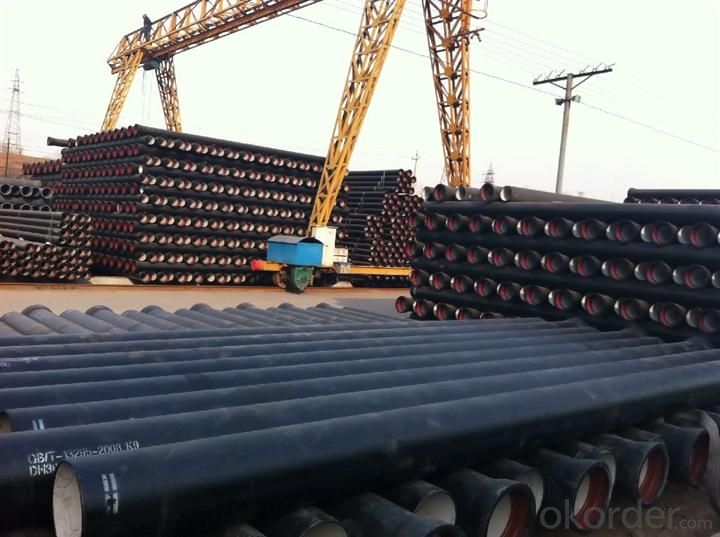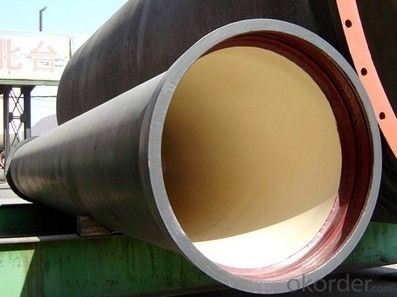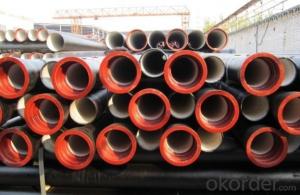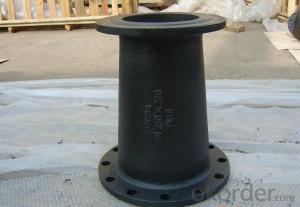Ductile Iron Pipe ISO2531:1998 DN100-DN1000
- Loading Port:
- China main port
- Payment Terms:
- TT or LC
- Min Order Qty:
- 20 m.t.
- Supply Capability:
- 200000 m.t./month
OKorder Service Pledge
OKorder Financial Service
You Might Also Like
1,Ductile Iron Pipe Description :
DI pipe fittings are manufactured according to ISO 2531 or BS EN545 or BS4772 FOR POTABLE WATER ,internal is cement lining or wet epoxy coating;External is zinc plus bitumen or wet epoxy coating. We also manufacture ductile iron fittings with fusion bonded epoxy both inside and outside. All the producets are sutible to water pipes fields.We have passed ISO9001,ISO14001,OHSMS18001 certificate.
Pipes confirm to ISO2531,K9 class,T type joint,6m long,with inside cements lining conform to ISO4179, outside Zinc spraying(130g/m2) and bitumen coating(70μm) conform to ISO8179.
Pipe ends: Spigot and socket ends, with 100% SBR rubber gaskets accoding to ISO4633.we can do third party inspection according to customer's request.
2,Main Features of the Ductile Iron Pipe:
1).Quality guarantee
• Chemical checking
• NDE after rough machining
• Mechanical testing after heat treatment
• Final NDE,dimension inspected
2).Quality document
• Full Q.A document as per client request
3).Packing and Shipping
• standard export package(carton/wooden case/pallet)
• accept FOB,FAS,CNF,CIF door to door etc or customer designated shipping agent
4).Service
• Drawing: we can translate your original drawing, offer best suggestion on design
• Quality: we have full set quality control system to guarantee the best quality.
• Inspection: inspect in house, all our products must be checked 3 times before packing
3,Ductile Iron Pipe Images:


4.FAQ:
We have organized several common questions for our clients,may help you sincerely
Q: Why would you choose ductile iron pipe rather than other pipe materials?
A:The reasons are obvious for that not only ductile iron pipe possesses the inherent strength and flexibility of ductile iron, combined with proven corrosion protection systems, but also the cost savings can be achieved from design to installation and commissioning.
Q:Why can you guarantee the inner of pipes can’t be corroded?
A: High alumina cement mortar lining and sulphate-resistant cement mortar lining. These two special linings are applicable to inner anti-corrosion for sewage pipes, improving resistance to erosion of the sewage components.
- Q:How to correctly measure ductile iron pipe
- The outer diameter of the ball tube is measured around the outer edge of the pipe. The caliper is used to measure the inside diameter of the pipe. The length of the pipe is measured by a ruler or tape measure,
- Q:What are the different accessories available for ductile iron pipe?
- There are several accessories available for ductile iron pipe, including but not limited to, flange adaptors, couplings, valves, fittings, joint restraints, gaskets, and tapping sleeves. These accessories help in connecting, repairing, and maintaining ductile iron pipe systems.
- Q:What are the advantages of using ductile iron pipes over other materials?
- There are several advantages of using ductile iron pipes over other materials. Firstly, ductile iron pipes have superior strength and durability compared to other materials such as PVC, HDPE, or concrete pipes. They have a high tensile strength, which means they can withstand higher pressure and can handle heavy loads without cracking or breaking. This makes them suitable for various applications, including water and sewage systems, as well as industrial pipelines. Secondly, ductile iron pipes have excellent corrosion resistance. They are typically coated with a protective layer, such as zinc or epoxy, which prevents the formation of rust and extends their lifespan. This makes them ideal for underground installations or in areas with aggressive soil conditions or corrosive substances. Another advantage of ductile iron pipes is their flexibility. They can be manufactured in various lengths, diameters, and angles, allowing for easy installation and adaptability to different project requirements. Additionally, their flexibility enables them to withstand ground movements, such as settlement or seismic activities, without causing significant damage. Furthermore, ductile iron pipes have a smooth internal surface, which reduces friction and improves flow efficiency. This results in lower energy consumption for pumping systems and reduced maintenance costs. Additionally, the smooth surface minimizes the risk of deposits or clogs, ensuring a consistent and uninterrupted flow of fluids. Lastly, ductile iron pipes have a long service life. When properly installed and maintained, they can last for over 100 years. This longevity not only reduces the need for frequent replacements but also provides a sustainable and cost-effective solution for infrastructure projects. In conclusion, the advantages of using ductile iron pipes over other materials include their superior strength, corrosion resistance, flexibility, smooth internal surface, and long service life. These qualities make them a reliable choice for various applications, providing efficient and durable solutions for water, sewage, and industrial pipelines.
- Q:How does ductile iron pipe compare to steel pipe in terms of durability?
- Ductile iron pipe and steel pipe possess distinct characteristics, but when it comes to durability, ductile iron pipe holds several advantages over its steel counterpart. To begin with, ductile iron pipe boasts exceptional resistance to corrosion. It incorporates a protective layer of zinc or cement lining that safeguards it against rust and corrosion, enhancing its durability and reducing the likelihood of leaks or failures. Conversely, steel pipe is vulnerable to corrosion, particularly when exposed to moisture or specific chemicals. This susceptibility can lead to structural problems and diminish its overall durability. Furthermore, ductile iron pipe exhibits remarkable impact resistance. It can endure substantial loads and external pressures without cracking or breaking, rendering it suitable for applications in high-traffic areas or situations where the pipe may be subject to accidental impacts. Steel pipe, despite its strength, can be more brittle and prone to fractures under similar circumstances. Moreover, ductile iron pipe boasts a longer service life compared to steel pipe. With proper maintenance, it has been known to endure for over a century, making it a dependable and long-lasting choice for infrastructure projects. Steel pipe, although still durable, may necessitate more frequent inspections and maintenance to ensure its longevity. In conclusion, ductile iron pipe surpasses steel pipe in terms of durability due to its corrosion resistance, impact resistance, and extended service life. Nevertheless, the selection between the two ultimately depends on the specific application, budgetary constraints, and other project requirements.
- Q:Can ductile iron pipes be recycled?
- Indeed, it is possible to recycle ductile iron pipes. Ductile iron, a form of cast iron, possesses exceptional strength and endurance, rendering it a favored selection for numerous purposes, such as water and sewage pipelines. Once these pipes have surpassed their useful lifespan, they can undergo recycling and be transformed into fresh merchandise. The recycling procedure comprises the fusion of the ductile iron pipes to extract the iron, subsequently serving as a raw material for the creation of novel ductile iron goods. By recycling ductile iron pipes, not only do we conserve natural resources, but we also diminish the environmental impact associated with mining and the production of new substances.
- Q:Can ductile iron pipes be used for irrigation systems in agricultural fields?
- Yes, ductile iron pipes can be used for irrigation systems in agricultural fields. Ductile iron pipes are known for their durability, strength, and corrosion resistance, making them a suitable choice for various applications, including irrigation systems. These pipes are capable of withstanding high pressures and can handle the demands of transporting water for irrigation purposes. Additionally, the ductile iron material is resistant to environmental factors such as UV rays, soil chemicals, and temperature fluctuations, ensuring a long lifespan for the pipes. Furthermore, ductile iron pipes have excellent flow characteristics, allowing for efficient water distribution throughout the agricultural fields. Overall, ductile iron pipes are a reliable and robust option for irrigation systems in agricultural fields, providing a sustainable and efficient solution for water distribution.
- Q:Can ductile iron pipes be used in contaminated soil conditions?
- Yes, ductile iron pipes can be used in contaminated soil conditions. Ductile iron is known for its strength, durability, and corrosion resistance, making it suitable for various soil conditions, including those contaminated with chemicals or other pollutants. The material's resistance to corrosion ensures that the pipes can withstand the harsh conditions and maintain their structural integrity over time. However, it is important to consider the type and level of contamination in the soil and consult with experts to determine if any additional protective measures or coatings are required to ensure the long-term performance of the pipes.
- Q:How much water seepage is allowed in the water pressure test for water hose DN300?
- The main control parameters of ductile iron pipes are nominal diameter, working pressure, connection mode, etc.. Light, high, thin wall, pressure resistance, shock resistance, corrosion resistance, earthquake resistance and other properties. The flexible interface is used for the pipeline interface, and there is a certain elongation and deflection angle. He has the advantages of raw iron pipes and steel pipes, avoiding the defects of iron and steel.
- Q:Can ductile iron pipes be made of flexible waterproof sleeves?
- Usually, a bushing is used to make a pool. It is the conduit to the sink. However, the common casing is difficult to seal so that there is water leakage between the casing and the pipe and water leakage between the casing and the wall. Only the waterproof sleeve can solve the water leakage between the casing and the wall, but it can not solve the seal between the casing and the pipe, and the flexible waterproof bushing can solve two problems.
- Q:What is the typical weight of ductile iron pipes?
- The weight of ductile iron pipes can differ according to their size and thickness. Nonetheless, as a broad reference, smaller diameter pipes typically weigh around 1 pound per foot, while larger diameter pipes can weigh several hundred pounds per foot. The weight of ductile iron pipes is influenced by factors like the dimensions of the pipes, the thickness of their walls, and the particular requirements of the intended use. It is essential to acknowledge that these weights are approximate and subject to variation depending on the manufacturer and product specifications.
1. Manufacturer Overview |
|
|---|---|
| Location | |
| Year Established | |
| Annual Output Value | |
| Main Markets | |
| Company Certifications | |
2. Manufacturer Certificates |
|
|---|---|
| a) Certification Name | |
| Range | |
| Reference | |
| Validity Period | |
3. Manufacturer Capability |
|
|---|---|
| a)Trade Capacity | |
| Nearest Port | |
| Export Percentage | |
| No.of Employees in Trade Department | |
| Language Spoken: | |
| b)Factory Information | |
| Factory Size: | |
| No. of Production Lines | |
| Contract Manufacturing | |
| Product Price Range | |
Send your message to us
Ductile Iron Pipe ISO2531:1998 DN100-DN1000
- Loading Port:
- China main port
- Payment Terms:
- TT or LC
- Min Order Qty:
- 20 m.t.
- Supply Capability:
- 200000 m.t./month
OKorder Service Pledge
OKorder Financial Service
Similar products
New products
Hot products
Hot Searches
Related keywords

























